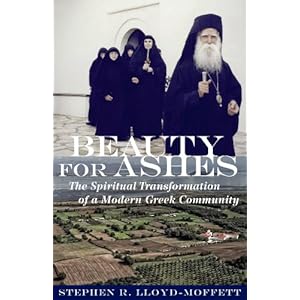
"The hope for change...does not then come from inspired programs, but from inspired clergy, that is, when the clergy are truly aspiring to become useful vessels of God. The fate of the Church lies primarily in who the clergy are becoming rather than what they do."
Here is a worthwhile read about a modern-day church scandal which is in the process of being turned around for the glory of God. Nothing flashy mind you. No big programs, clever methods or exalted committees. This is an account rather of how one man's dedication to follow the commands of Christ is transforming the life of a city. This is a story about how the authentic holiness of a simple monk turned bishop (Metropolitan Meletios of Nikopolis and Preveza) became contagious and a veritable evangelistic tour de force. There are some universal lessons to be had from this account.
Even though Stephen Lloyd-Moffett initially started out his decade long study to discover a practical model for spiritual transformation, in the process he came to question the very validity of developing such a model. To his surprise he discovered that Bishop Meletios never set out to develop or use a program. Instead, through his own example, he restored the integrity of his priests; he set out to restore the church experience to its spiritual, aesthetic and traditional glory; and he labored to educate the people and re-establish monasticism.
As surely as Metropolitan Meletios did not use a "model" or program, Stephen Lloyd-Moffett did however analyze his encounter with Bishop Meletios and the people of Preveza in what he calls this "dynamic process in which the ancient faith finds its home in the modern world", and presents these notable principles.
- The Church is and must remain "of God" and not "of man". Programs and designs are based on human arrogance, a desire to play God. "The purpose of the leaders of the Church should be to act as a conduit or vessel of the divine, not a marketing arm of God."
- The bishop and clergy must lead and witness by their own example. "the hope of the Church is found in each of its representatives living within the imperishable Life of Christ"
- The Church must be universal in scope and uniting in action. Christ died for all people and therefore the Church is to remain independent from political affiliation and entanglements.
- The Church must cultivate the external elements of faith in parallel to the internal elements. Authentic faith in Christ will influence the external elements of our life.
- The Church should integrate monastics into the community. Monastics serve as an inspiration to others by means of their holiness and complete dedication to Christ.
The value of this book is in its refreshing approach it offers to the common struggles the Church faces in the modern world. We must change while remaining unchanged; we must shine while embracing obscurity. The power of true, authentic spirituality is the very power of God in our midst.
"Our hope does not lie in trendy charismatic revivals, clever programs, or well designed worldly motivators. Our hope is not placed in a human institution. Our hope is in God. As long as the true nature of the Church is not forgotten, we will never lose hope and fall into despair no matter what the circumstances we face. Yet this hope is predicated upon an understanding of the Church as the mystical vessel of God's grace and will. It is not an institution we run, but a mystery in which we dwell. Only then will we be energized by the imperishable Life of Jesus Christ."
May we all be energized by the imperishable Life of Christ indeed. There is much work to do, much transformation needed. First and foremost by and in me. May God in His ineffable mercy grant it so.
4 comments:
A few selections from this book that you might be interested in are posted here:
http://orrologion.blogspot.com/2010/07/he-would-offer-no-strategic-plan-or.html
http://orrologion.blogspot.com/2010/07/on-afania-holy-obscurity.html
Thank you Melxiopp for those links. I wasn't aware that Orrologion had reviewed the same. The passage about "afania" -obscurity- stood out to me as well. In one passage it is said that the monks "did not desire to become great". Wow! This goes against everything we are taught from the cradle on.
What this account demonstrates and confirms is that any changes, any true and lasting changes are going to come about slowly, organically and without modern "church growth" type of approaches and systematic methods. It will require a change in ethos, and ecclesiastical mindset as Bp. Meletios calls it, and among other things a change in our understanding of what constitutes evangelism and how to go about it. What is the purpose and meaning of the Church? What is authentic holiness?
Here is a favourite quote of mine from this book:
I boast that I have nothing except my rason (monastic cloak) which is of minimal value and a few books. My most valuable possession is my pure conscience and my freedom. I boast that I am absolutely free of worldy attachments. My target is to be and to remain always such; absolutely free from men - absolutely and completely a servant of Christ. -Bishop Melitios of Nikopolis and Preveza
Anonymous,
Yes thank for you that quote. Very powerful especially in the given context and now also for us given some of the news we have heard at certain HQ's.
May we all attain such a Christlike mind.
Post a Comment